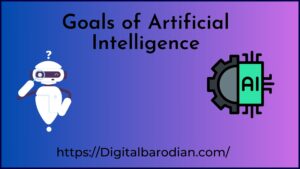
In this article, we will explore the primary goals of artificial intelligence and how they shape the development and application of this powerful technology. Artificial Intelligence (AI) has emerged as one of the most transformative and rapidly advancing fields of technology in recent years. It encompasses a wide range of techniques and applications that enable machines to mimic human intelligence, learn from data, and perform tasks that traditionally required human cognition. As AI continues to evolve, it is crucial to understand its goals and objectives.
Goals of Artificial Intelligence
1. Mimicking Human Intelligence
One of the primary goals of AI is to mimic human intelligence in machines. This involves developing algorithms and models that can reason, solve problems, understand natural language, and perceive the world through sensors and data inputs. While AI may not replicate human intelligence entirely, the aim is to capture key aspects of it to make machines more capable of performing complex tasks and interacting with humans in a natural and intuitive manner.
2. Machine Learning and Adaptation
AI seeks to enable machines to learn and adapt from data. Machine learning, a subset of AI, focuses on developing algorithms that can improve their performance on a task as they gain experience and exposure to more data. This goal involves creating systems that can recognize patterns, make predictions, and make decisions based on the information they gather, ultimately becoming more proficient over time.
3. Automation and Efficiency
AI aims to automate tasks and processes that are repetitive, time-consuming, or dangerous for humans to perform. By leveraging AI technologies like robotics, natural language processing, and computer vision, businesses and industries can enhance efficiency, reduce costs, and improve safety. Automation is a key driver behind many AI applications, from manufacturing to customer service.
4. Problem Solving and Decision Support
Another significant goal of AI is to provide effective problem-solving and decision support tools. AI systems can analyze vast amounts of data, uncover hidden insights, and assist in making informed decisions. This capability is invaluable in fields like healthcare, finance, and logistics, where the ability to process and interpret complex information can lead to better outcomes.
5. Enhancing Human Creativity and Collaboration
AI has the potential to augment human creativity and collaboration. By automating routine tasks and offering intelligent suggestions, AI can free up human professionals to focus on more creative and strategic aspects of their work. Additionally, AI-driven collaboration tools can facilitate efficient communication and cooperation among teams, even across geographical boundaries.
6. Understanding and Exploring the World
AI’s goal is not only to solve problems but also to understand and explore the world. From self-driving cars that navigate through complex traffic scenarios to language translation tools that bridge communication gaps, AI systems aim to interact with and comprehend the real world in ways that were previously thought to be exclusive to humans.
7. Ethical and Responsible AI
Ensuring that AI is developed and used ethically and responsibly is a critical goal. As AI becomes more integrated into society, there is a growing awareness of the need to address issues such as bias in algorithms, privacy concerns, and the impact of AI on employment. Efforts are being made to establish guidelines and regulations that promote the responsible use of AI technologies.
8. Advancing the Frontiers of Knowledge
AI is also driven by the goal of advancing the frontiers of knowledge in various scientific and technical disciplines. Researchers in AI are constantly pushing boundaries, developing new algorithms, and exploring novel applications. This quest for knowledge contributes not only to the field of AI itself but also to our understanding of human cognition and the potential of intelligent systems.
Conclusion
In conclusion, the goals of artificial intelligence are multifaceted and dynamic. While AI aims to mimic human intelligence, it also strives to automate tasks, support decision-making, enhance creativity, and explore the world. Ethical considerations are becoming increasingly important as AI technologies proliferate. As AI continues to evolve, it is essential to align its development and deployment with the values and aspirations of society to ensure that it benefits humanity in the most positive and responsible ways possible.
- Learning Agents in AI
- Problem Solving Agents in AI
- Types of Intelligent Agents in AI
- Structure of Agents in AI
- Knowledge Based Agents in AI
- Agents in AI
- Scope of AI
- Artificial Intelligence in Healthcare
- Free AI Essay Writers
- AI Essay Writers
- Examples of AI
- Types of Artificial Intelligence
- Application of AI
- What Is AI Art?
- What Is AI?
- Online Free AI Story Generator
- AI Story Generators with Tools
- Character AI
- Beta Character AI
- AI Voice Generator Tools
- Top 50 Best Free AI Tools
